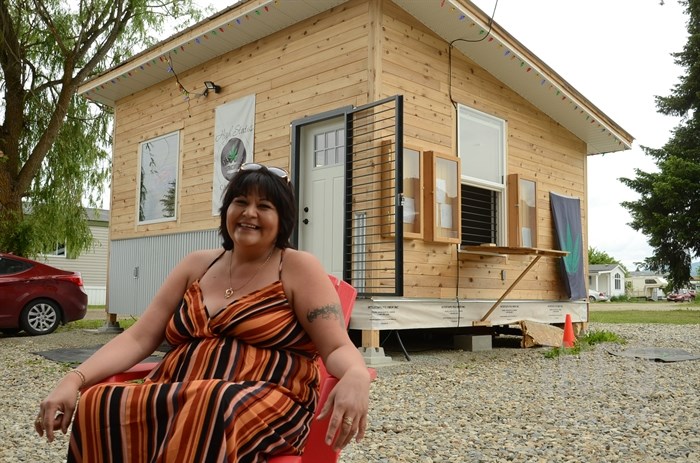Splatsin cannabis store closing; band leadership blamed for oversaturated market

A Splatsin cannabis store owner says she's closing her business due to the oversaturation of pot shops on the reserve and holds the Band's leadership responsible after it failed to put any regulations in place.
Splatsin member River Johnson says her cannabis store is one of just two that are 100 per cent Indigenous-owned out of roughly 12 stores on the reserve.
"It's a free for all here," Johnson told iNFOnews.ca. "And I do believe some (Splatsin) members are being exploited."
Johnson opened High Status cannabis in August 2019 and her business got off to a good start.
However, she says the influx of non-Indigenous people coming to the reserve to skirt provincial rules and set up cannabis stores has oversaturated the market.
"It's out of control and leadership isn't doing anything to get it under control," she said.
Anyone who has driven along Highway 97A through Enderby will have seen the proliferation of cannabis stores along the highway. Another one opened just a few weeks ago and there are now several within a stone's throw of a daycare.
READ MORE: Enderby area dubbed 'Greenderby' as pot shops bloom
While non-Band members aren't allowed to just set up shop on the reserve, non-Band members can go into a partnership which generally involves renting Band land and then opening a store.
"It's like an evolved welfare system, people just rent out a piece of the property and they collect the cheques," she said. "There shouldn't be partnerships, there should be an advantage for our people to try to pull ourselves out of (poverty)."
The business owner compares the situation to the early days of colonialization when Indigenous peoples were manipulated for whiskey.
"Everybody blames the Indians for setting up all the shops but it's not the Indians, it's not Indigenous people invading taxes, invading rules and standards," she said.
Johnson said the simple introduction of Splatsin bylaws could have prevented the situation. She said she approached the Band council on several occasions over the last two years asking for regulation.
She'd like to see rules in place so cannabis stores can only be 100 per cent Splatsin owned and operated.
She points to the Okanagan Indian Band and Tk'emlúps te Secwepemc in Kamloops who both brought in bylaws within months after an influx of pot shops opened on the reserve.
In October 2019, former Splatsin Cheif Wayne Christian told Global News that the Band would be coming up with its own regulations for cannabis sales.
However, Johson says nothing was ever put in place.
The influx of cannabis stores on Indigenous land has frustrated cannabis store owners on non-Band land who have to jump through hoops and spend big sums to be allowed to open stores.
A survey done in 2021 by the Okanagan Cannabis Collective survey found that 90 per cent of government licenced cannabis retailers were in direct competition with weed stores on Indigenous land. The survey also found that 60 per cent of those stores did not believe they had a viable business.
The provincial government has entered into several government-to-government agreements with Indigenous communities around the province regarding cannabis production and sales.
READ MORE: Stores beginning to close in Okanagan's oversaturated cannabis market
However, Johnson doesn't believe this is the way forward.
"I still don't believe that we need the Canadian government and the provincial government to come in and tell us how to manage things," she said. "I still believe in us regulating our own industry here, I believe that's important if it's done appropriately and done effectively... we have enough brilliance, smart enough educated people that know how we could do this in a good way, and utilize our own resources that way."
She reiterates what she would like to see is 100 per cent Splatsin-owned businesses on the reserve. She says she's employed about a dozen people since the store opened.
"I want Indigenous people to rise, in this industry there are so many things you can do, you can create and make edibles you can grow the product, you can make the extract, you can make the CBD, there's just so many (and)... it can be done cooperatively," she said.
A new chief and council were elected earlier this month but it's not clear whether anything will change.
READ MORE: Vernon is the cannabis capital of B.C.
With a lack of action from the former chief and council, the area of roughly 3,000 people has about 12 cannabis stores.
Johnson says this over-saturation is too much for her business.
She said she'll be closing her doors for good at the end of February.
"We can no longer employ Splatsin people because the market is saturated, and I do hold leadership responsible for that," she said.
The Splatsin Band was not immediately available for comment.
To contact a reporter for this story, email Ben Bulmer or call (250) 309-5230 or email the editor. You can also submit photos, videos or news tips to the newsroom and be entered to win a monthly prize draw.
We welcome your comments and opinions on our stories but play nice. We won't censor or delete comments unless they contain off-topic statements or links, unnecessary vulgarity, false facts, spam or obviously fake profiles. If you have any concerns about what you see in comments, email the editor in the link above.



